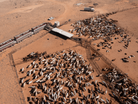Mitsubishi & CH4 Global Slash Scope 3 Methane Emissions

In a groundbreaking move to address Scope 3 emissions in the agricultural sector, Japanese vehicle manufacturing giant Mitsubishi is partnering with Australian innovator CH4 Global. The strategic collaboration aims to scale up production and adoption of CH4's Methane Tamer, a revolutionary product designed to combat one of agriculture's most significant climate challenges: methane emissions from cattle.
The methane dilemma in agriculture
According to the International Energy Agency (IEA), methane, a potent greenhouse gas, is responsible for approximately 30% of the current rise in global temperatures. Methane severely threatens our climate, with a heat-trapping capacity of more than 80 times that of carbon dioxide in 20 years.
Agricultural emissions, particularly from livestock, are the primary source of methane. As global meat production grows alongside population increases, tackling the issue has become increasingly urgent for policymakers and industry leaders alike.
Inger Anderson, Executive Director at the United Nations Environmental Program (UNEP), highlights the critical nature of the challenge:
"Cutting methane is the strongest lever to slow climate change over the next 25 years and complements necessary efforts to reduce carbon dioxide."
CH4 Global's methane tamer: A Scope 3 game-changer
CH4 Global's flagship product, Methane Tamer, is at the heart of the partnership. The innovative feed supplement, derived from Asparagopsis seaweed, has demonstrated the ability to reduce enteric methane emissions from cattle by up to 90%.
Heath Tiller, Principal Operator at HB Rural, a farming company specialising in lamb and beef, attests to its practicality:
"It's a straightforward product that is dust free, easy to handle, mixes well with feed and cattle like it."
By targeting methane emissions at the source, Methane Tamer offers a promising solution for companies looking to reduce their Scope 3 emissions throughout their agricultural supply chains.
Scaling production: Mitsubishi's crucial role
While CH4 Global has successfully developed and tested Methane Tamer, scaling up production presents the next significant challenge. The change is where Mitsubishi's expertise becomes invaluable.
The partnership will leverage Mitsubishi's global supply chain knowledge and market presence to:
- Navigate regulatory pathways in the Japanese market
- Optimise feed formulations in Australia
- Conduct feasibility studies for scaled production in Southeast Asia
Steve Meller, CEO at CH4 Global, highlights the significance of this collaboration:
"This partnership with Mitsubishi Corporation marks another significant milestone in our mission to achieve gigaton-scale emissions reductions by 2035."
Asia-Pacific focus: A strategic approach to Scope 3 reduction
The partnership's initial focus will be on Australia and Japan, two key markets in the Asia-Pacific region. In Australia, efforts will centre on expanding Methane Tamer sales and developing new product formulations.
Meanwhile, in Japan, where approximately 4 million cattle represent a significant opportunity for methane mitigation, the partners will work on introducing the product and navigating regulatory approvals.
Sustainable production: Addressing the supply chain
A critical aspect of the Scope 3 emissions reduction strategy is to develop a sustainable and scalable production process for Asparagopsis seaweed, the key ingredient in Methane Tamer.
Mitsubishi's extensive experience in aquaculture and agricultural operations across Asia provides a strong foundation for identifying potential production sites in Southeast Asia.
CH4 Global's EcoPark cultivation system integrates environmental sustainability with economic viability, highlighting the company's commitment to creating a profitable and subsidy-free supply chain.
Implications for manufacturing and supply chain management
For the manufacturing industry, the partnership exemplifies the growing intersection between environmental stewardship and innovation in addressing Scope 3 emissions. As countries face increasing pressure to meet international climate targets, solutions like Methane Tamer offer a practical path forward for companies looking to reduce their environmental impact throughout their supply chains.
Given its prominence in global supply chains, Mitsubishi's involvement is particularly significant.
As Steve explains:
"Mitsubishi's deep experience in agricultural products and services and strong presence across Asian markets makes them an ideal partner as we work to expand the reach of our innovative methane reduction solution."
A global vision for Scope 3 emission reduction
While the partnership's immediate focus is regional, its ambitions are global. CH4 Global aims to achieve gigaton-scale emissions reductions by 2035, demonstrating the potential impact of this technology on Scope 3 emissions worldwide.
Steve highlights the urgency and scale of their mission:
"Humanity's best chance for long-term survival as a species is achieving gigatonne-level CO2-e reductions by 2030. That's what CH4 Global focuses on singularly. Commercialising, at scale, the only technology platform that can deliver this level of impact."
As companies increasingly seek ways to reduce their Scope 3 emissions, partnerships between Mitsubishi and CH4 Global offer a blueprint for innovative, cross-industry collaborations that can drive significant change in the fight against climate change.
Make sure you check out the latest industry news and insights at Scope 3 Magazine and be part of the conversation at our global conference series, Sustainability LIVE and Procurement & Supply Chain LIVE.
Discover all our upcoming events and secure your tickets today. Subscribe to the Scope 3 Magazine newsletter.
Scope 3 Magazine is a BizClik brand.
- LEGO's US$2.75M Pledge Tackles Scope 3 Carbon EmissionsScope 1 2 and 3
- Maersk Sustainability Reporting: Navigating Scope 3Transportation & Logistics
- SHEIN’s Scope 3 Emissions: Fast Fashion’s Carbon BurdenCircular Economy
- Tackling Super Bowl LIX's Scope 3 Emissions ChallengeScope 1 2 and 3
Featured Articles
Estonia, Latvia and Lithuania join the European grid, cutting ties with Russian energy, a move that boosts regional security and sustainability
TÜV SÜD: New battery regulations bring Scope 3 hurdles, requiring sustainable sourcing, digital traceability and design changes increasing compliance
Nissan is scaling up its use of green steel, reducing CO2 emissions in its supply chain as part of its goal to achieve carbon neutrality by 2050

